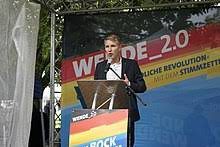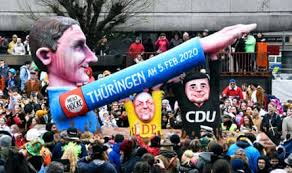
By Werner Klein
Germany’s far-right are celebrating their biggest election victory since the 1930s, after Alternative for Germany (AfD) became the largest party in one eastern German state and the second-largest in another.
Yesterday’s results have strengthened the hand of the most extreme faction in AfD, the so-called Flügel or “wing”, headed by Björn Höcke (above), who leads the party’s branch in Thuringia.
Höcke has been a member of the Thuringian Landtag (state parliament) since 2014, but just three years ago the AfD leadership tried to expel him for extremism. It’s frequently been stated that Höcke wrote articles for the neo-nazi magazine Volk in Bewegung published by fellow Thuringian Thorsten Heise. While Höcke has denied this, he has refused to make a sworn statement on the matter, and Searchlight has long been aware of his close ties to Heise and other nazis.
On several occasions Höcke has made rhetorical gestures towards Holocaust denial and other hints of support for the Third Reich. He has been investigated by the German security services, and even charged and fined for using nazi slogans. In 2017 he called on Germans to cease apologising for the Holocaust, and implied in a newspaper interview that Adolf Hitler should no longer be viewed as “only bad”.

This is the man who has now led the first regional election victory for the far-right in the history of post-war Germany.
Yesterday Höcke’s AfD won 32 of the 88 seats in the Thuringian parliament and was easily the largest party with 32.8% of the vote, well ahead of the conservative CDU on 23.6%. Some right-wing CDU members are calling for coalitions between their party and AfD, but it seems certain that their leaders will try to maintain a “firewall” between mainstream parties and the far right.
One important factor is that a small group on CDU’s right-wing who favoured coalition with AfD have already broken away, and their new party WerteUnion (‘Values Union’) was trounced in both Thuringia and Saxony yesterday. This means there is no obvious bridge between the two parties.
A further complication is that Galloway-style populists and pro-Moscow elements have formed a new party, the Sahra Wagenknecht Alliance (BSW), chaired by two former leaders of the Left Party that grew out of the old East German Communists.
BSW has existed for less than a year, but finished third yesterday in both Thuringia and Saxony, another former East German state. This was a personal disaster for Thuringia’s Minister-President Bodo Ramelow, who is from the Left Party and is a longstanding factional opponent of Wagenknecht.
The Left Party lost more than half of their seats in Thuringia and fell from first place in 2019 to fourth yesterday. Thuringia’s Greens (who were in coalition with the Left and the social democratic SPD) and the liberal FDP fell below the 5% threshold, so lost all their Landtag seats.
It seems likely that the CDU will try to form a minority government in Thuringia with the SPD, but the main question now is whether the supposedly left-wing BSW will cooperate with efforts to keep AfD’s crypto-nazis out of power, or will prioritise the interests of their friends in Moscow.
It would be appalling to see a man like Björn Höcke have any influence over a state comprising 2 million people. The right-wing press in Britain will make all sorts of excuses, and pretend that AfD are a legitimate voice of anti-immigration politics. They aren’t.
Höcke is a barely disguised nazi. Thorsten Heise, his ally in what was once the NPD (now Heimat) is one of the most violent Hitlerites in Europe. Heise has many British connections ranging from the skinhead music scene to Holocaust deniers. He is presently facing a range of criminal charges for his open nazism.
The results in Saxony were not much better. There the CDU retained first place with 41 seats to AfD’s 40, but again BSW with 15 seats will have considerable influence over whether a stable state government can be formed.
Superficially, it might seem that AfD’s rise has damaged the older parties of Germany’s far right. For example in Saxony, the neo-nazi NPD won Landtag seats in 2004 and 2009. In recent years NPD support declined to almost nothing, and the party rebranded as Heimat.
But below the surface Heimat officials are delighted with the trend of events. Like Höcke, they are staunch supporters of Putin’s murderous dictatorship and his allies, especially the brutal Syrian regime of the Assad family, and they hope to continue a pattern of discreet connections to AfD in various thinktanks and “cultural associations” that bring together the parliamentary right with a broader range of nationalist and “identitarian” extremists.
A small faction of Germany’s nazi scene has stood out against AfD and Heimat, and opposes Moscow’s hegemony. This element has formed Dritte Weg (Third Path or Third Way), and has built connections with anti-Putin football hooligans as well as more ‘intellectual’ Hitlerites. During the past year Dritte Weg officials have visited Spain and Britain, where they have strong connections to the hardcore nazi Devenir Europeo, and have held meetings with DE’s most famous young propagandist Isabel Peralta and her friends at Heritage & Destiny.
Two Dritte Weg activists attended the H&D conference in Preston last year where Peralta spoke, and their leader has been interviewed by H&D’s assistant editor Peter Rushton.
On September 22nd Dritte Weg will be fighting the Landtag election in Brandenburg. They are certain to be trounced by AfD, but they hope to position themselves as the only active party to the right of AfD and to benefit if Germany’s divisions move away from parliaments towards street violence.





